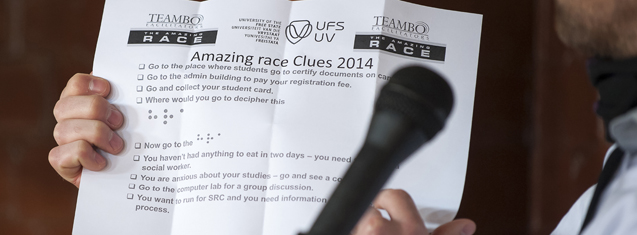Latest News Archive
Please select Category, Year, and then Month to display items
19 November 2018
|
Story Charlene Stanley
|
Photo Charlene Stanley
 Prof John Mubangizi, Dean of the Faculty of Law, encouraged delegates at the Fifth Annual International Mercantile Conference to share ideas on best international practice in their various fields.
Prof John Mubangizi, Dean of the Faculty of Law, encouraged delegates at the Fifth Annual International Mercantile Conference to share ideas on best international practice in their various fields.
“Don’t say anything online that you wouldn’t want plastered on a billboard with your face on it.”
This famous quote by international tech expert Erin Bury should be a guiding light when it comes to online habits in the workplace, according to Francois Cilliers, UFS Lecturer in Mercantile Law.
In his presentation Could Social Media be the Gateway to Employment Discrimination? he warned that employees have a responsibility not to bring their employers in disrepute through their comments on social media.
“Posts, updates, tweets, and comments are considered to be publications and can therefore never be seen as privileged information,” he explained.
Responsibility on employees and employers alike
He pointed out that employers also had a responsibility regarding the way in which they use the information about prospective employees obtained via social media.
“Nowadays, approximately 75% of companies hire through social media. In the US, recruiting companies spend hours researching candidates, making full use of what they can find on social media. It was found that 50–80% of employers frowned upon posts and pictures featuring drug and alcohol abuse, profanity, and bad grammar.”
He warned that employers needed to tread lightly, as a decision not to employ someone as a result of information on the prospective employee’s political views and sexual orientation could constitute unfair discrimination as set out in the Employment Equity Act.
“An employer who wishes to use a screening process (utilising social media) has to prove that the information and the process is objectively necessary and can be justified with reference to the inherent requirements of the job,” he explained.
“As technology and electronic systems advance, so too should the applicable labour laws.”
Cilliers’ presentation formed part of the Fifth Annual International Mercantile Law Conference recently hosted by the Faculty of Law on the Bloemfontein Campus.
Incorporating new technology in teaching and research
“This conference is an opportunity to share ideas on best practice in what is perceived as a ‘difficult’ field within Law,” said Prof John Mubangizi, Dean of the Faculty of Law, as he opened the proceedings. Topics in the discussion sessions ranged from Racism in the workplace and The underrepresentation of females in the judiciary, to Decriminalisation of cannabis: A recipe for healthy employer-employee relations?
“Conferences such as these help us to take advantage of the newest developments in technology to advance our teaching and research,” said Prof Mubangizi.
“To quote Einstein: ‘We can’t solve problems by using the same kind of thinking we used when we created them.’”
Staff experience running in the shoes of students
2014-07-29

Photo: Sonia Small
From having to upload money on a card and buying lunch at Thakaneng Bridge to naming the SRC members, some UFS staff members got to experience life as a full-time student on our Bloemfontein Campus.
During their 2014 Purpose Summit on 22 July, staff from Student Affairs competed against each other in an Amazing Race.
“We got to see how students actually run around on campus each day,” said Elize Rall from Residence Life. “We always hear from parents how their children have to go from one place on campus to the other to get things done … and now we know what they are talking about.”
Staff who attended the summit was divided into teams during the morning’s practical session. Similar to the popular television programme, The Amazing Race, there were quite a few checkpoints – often with some formidable challenges and quizzes.
To make their tasks even more difficult, the participants were forced to take the route students with disabilities would have taken. This means: no stairs could be climbed and no curbs could be jumped – they could only use ramps and elevators.
"The experience was extra-ordinary," said Lerato Masapo from Residence Life. "I learned a lot and I didn't realise how difficult it was for our disabled students to move around the campus.
"What struck me the most was the distance between every building and how far the students had to walk to reach certain places. This made me realise the importance and responsibility on us as staff members to know our environment and assist students accordingly in that regard."